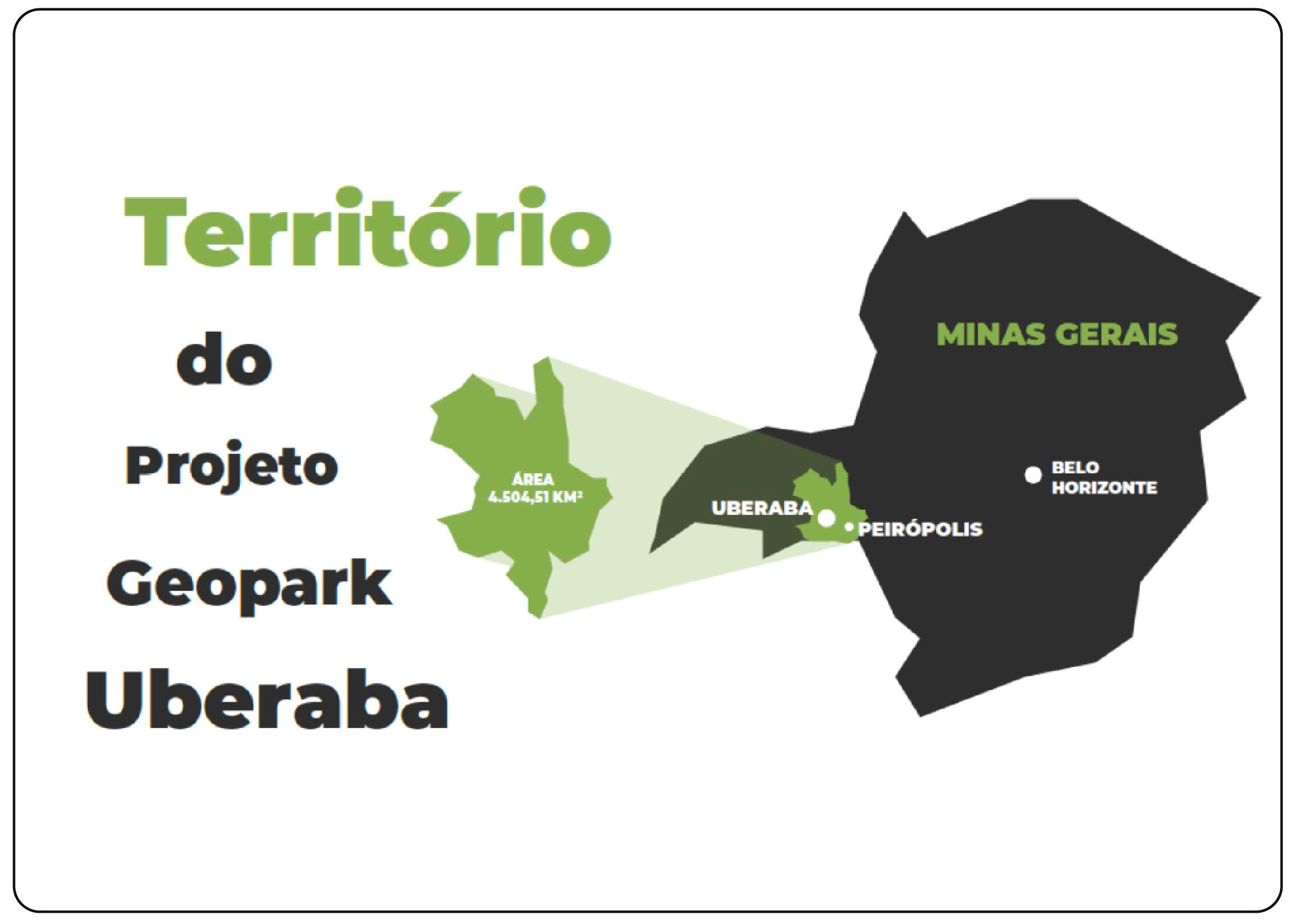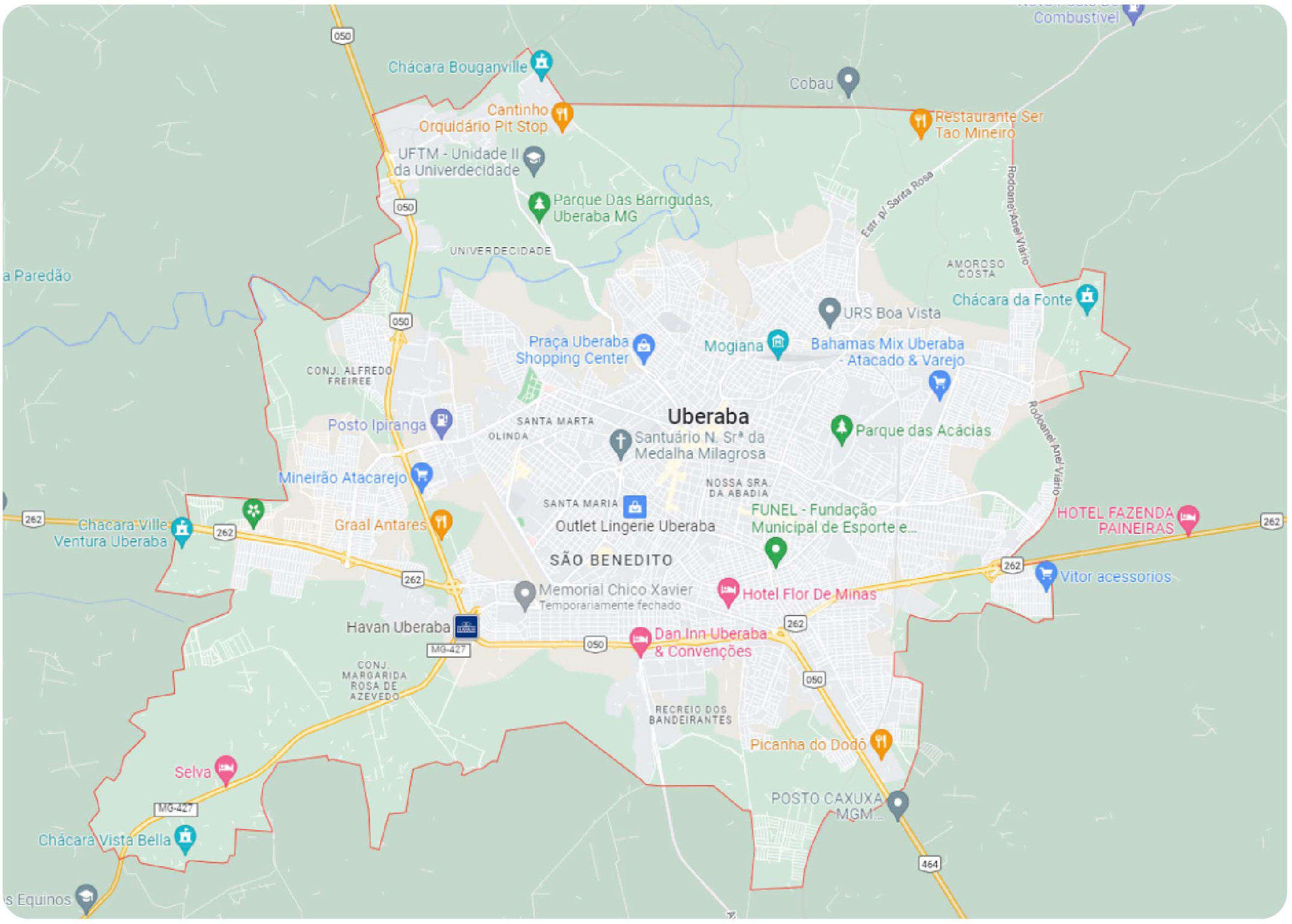History of the Geopark Uberaba Project
In 2014, geologist Luiz Carlos Borges Ribeiro was the first to envision the city of Uberaba as a potential geopark. This vision culminated in his doctoral thesis entitled 'Geopark Uberaba Project - Land of Dinosaurs in Brazil.'
Based on his research, Ribeiro began attending meetings of global geoparks. At one of these events, he spoke with one of the founders, Guy Martine (a French geologist from the European Geoparks Network), and presented his 'Geopark Uberaba Project - Land of Dinosaurs in Brazil.' With expertise in the subject, Martine advised Ribeiro to change the name of the project, as limiting Geopark Uberaba to being only the Land of Dinosaurs in Brazil would disregard all the other geological, cultural, and historical aspects that Uberaba offers.
In 2017, Ribeiro managed to bring together the three most representative institutions in the municipality of Uberaba: the Municipal Government of Uberaba (PMU), the Federal University of Triângulo Mineiro (UFTM), and the Brazilian Association of Zebu Breeders (ABCZ), where he presented his doctoral research. The representatives of these institutions, aiming for a unique opportunity for the city of Uberaba to become a tourism, research, and business hub, accepted the challenge and became the consignees of the project.
With the instruction given by Martine, Ribeiro and the members of the aforementioned institutions decided to change the name. Thus, thinking more broadly and based on the other two cultural sources that Uberaba possesses - spirituality, with the representativeness of the emblematic Chico Xavier, and livestock tied to Zebu cattle - the name of the project changed and addressed the three icons of the city.
In this way, the new name contemplated both the geological and cultural aspects of the city of Uberaba. In the same year, 2017, the consignees signed the Protocol of Intentions for the creation of the Geopark Uberaba Terra de Gigantes project, attributing the Terra de Gigantes to Chico Xavier, Zebu, and Dinosaurs. In 2019, with the objective of fostering the project's economic development actions, the Brazilian Service for Support to Micro and Small Enterprises (SEBRAE) joined the Geopark Uberaba Project, becoming the fourth consignee institution.
In his thesis, Ribeiro demonstrated that the municipality of Uberaba concentrates a diversity of paleontological sites associated with a high degree of preservation of these fossils. For example, the Peirópolis Cultural and Scientific Complex - through the Llewellyn Ivor Price Paleontological Research Center - is currently a global reference for the study of the continental fauna that existed during the Upper Cretaceous period (80 to 65 million years ago), keeping a good portion of the dinosaur fossils described in the country in its collection.
Thus, the rich geological heritage (of international recognition) of Uberaba allows fulfilling one of the mandatory requirements to become a member of the UNESCO Global Geoparks Network. The numerous and different species of fossils found throughout the territory of Uberaba allowed Ribeiro, together with the technical team of CPRM, to define the municipality's territory as the area of the Geopark Uberaba. This territory totals an extension of 4,540.51 km², a dimension similar to other European geoparks.
The integration of geological heritage with the historical and cultural values that Uberaba offers contributes to the construction of a singular identity for this territory in line with the purposes provided for geoparks according to the UNESCO concept


What benefits does Geopark Uberaba bring to the city?
To conserve, promote, and value the cultural, historical, and geological heritage;
Promote sustainable tourism; carry out actions to protect, conserve, and promote natural heritage, especially geodiversity and biodiversity with special emphasis on geological heritage;
Boost the development of local economic activities, stimulate and support local entrepreneurship, conserve tangible heritage and promote intangible heritage;
Promote and carry out actions aimed at developing sustainable and balanced socio-economic, cultural, and environmental aspects of the municipality of Uberaba;
Participate in events organized by public or private entities that fall within the scope of the Geopark's responsibilities and also provide services to members, local agents or others, as well as collaborate and foster the development of local commerce, regional handicrafts, local products and services, and others. Promote scientific research related to geological and geomorphological heritage;
Raise awareness among the local population about the conservation of geological, historical, and cultural heritage. Promotion of formal and informal environmental education;
Improve the quality of life of the population in which the Geopark Uberaba is located.
Mission of the Geopark Uberaba Project
“Valuing the geological, historical, ecological, and cultural heritage through geopreservation, education, and tourism to promote sustainable socio-economic development of the region encompassed by the territory of Uberaba in which the Geopark Uberaba Project is inserted.”
Vision of Geopark Uberaba Project.
“To be a member of UNESCO's Global Geoparks Network.”
Team of the Project - Working Group
The Geopark Uberaba Project team is divided into 8 working groups, in addition to the Executive Secretary.
Executive Secretary: Lucia CruvinelContact:
contact@geoparkuberaba.com.br
- Management Working Group
Coordinator: Stela Moraes
Contact: stela.morais@uftm.edu.br
- Communication Working Group
Coordinator: Gyzah Pereira
Contact: gyzah.barros@uftm.edu.br
- Legal and Financial Group
Coordinator: Raphael Arduini
Contact: raphael.arduini@uftm.edu.br
- Geology and Geoconservation Working Group
Coordinator: Luiz Carlos Borges
Contact: luiz.ribeiro@uftm.edu.br
- Education Working Group
Coordinator: Luis Carlos Afonso Júnior
Contact: junior@ensinoopcao.com.br
Coordinator: Fabrício Corradini
Contact: fabricio.corradini@uftm.edu.br
- Cultural Heritage Working Group
Coordinator: Thiago Riccioppo
Contact: thiago.riccioppo@abcz.org.br
- Natural Heritage Working Group
Coordinator: Carolina Almeida
Contact: caroline.almeida@uftm.edu.br
Coordinator: Leonardo Silveira
Contact: leonardo.silveira@uftm.edu.br
- Tourism Working Group
Coordinator: Paula Cusinato
Contact: paula.cusinato@uftm.edu.br
Coordinator: Maria Aparecida Basilio
Contact: diretoriadeturismo@uberaba.mg.gov.br
- Sustainable Economic Development Working Group
Coordinator: Marcius Mendes
Contact: marcius.marques@sebraemg.com.br
Coordinator: Vanessa Oliveira
Contact: vanessa.oliveira@sebraemg.com.br
- Executive Secretary
Lucia Cruvinel
Contact: contato@geoparkuberaba.com.br
Scientific Committee
Under construction...















 Versão Português
Versão Português